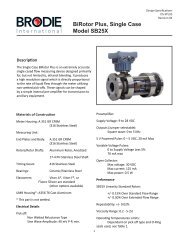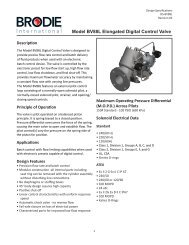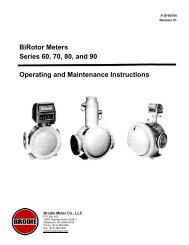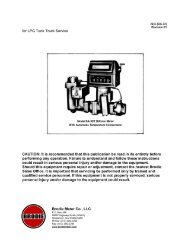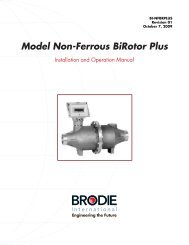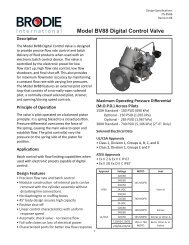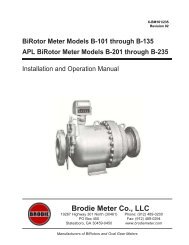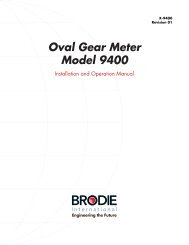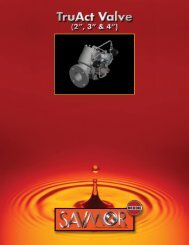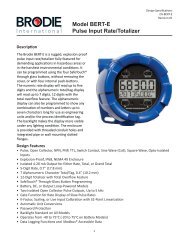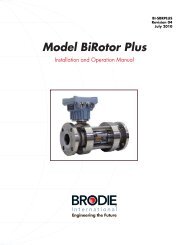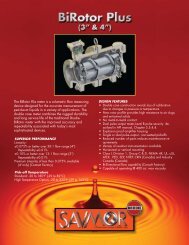9900 Oval Manual - Brodie International
9900 Oval Manual - Brodie International
9900 Oval Manual - Brodie International
- No tags were found...
Create successful ePaper yourself
Turn your PDF publications into a flip-book with our unique Google optimized e-Paper software.
X-<strong>9900</strong>Revision 03Model <strong>9900</strong> Series <strong>Oval</strong> Gear Meterwith Smart Meter ManagerInstallation and Operation <strong>Manual</strong>1<strong>Brodie</strong> Meter Co., LLC19267 Highway 301 North (30461)PO Box 450Statesboro, GA 30459-0450Phone: (912) 489-0200Fax: (912) 489-0294www.brodiemeter.comManufacturers of BiRotors, <strong>Oval</strong> Gear Meters, and Control Valves
22222222
Essential Instructions<strong>Brodie</strong> Meter Co., LLC designs, manufactures and tests its products to meet many national andinternational standards. Because these instruments are sophisticated technical products, you mustproperly install, use and maintain them to ensure they continue to operate within their normalspecifications. The following instructions must be adhered to and integrated into your safety programwhen installing, using and maintaining <strong>Brodie</strong> Meter Co., LLC products.• Read all instructions prior to installing, operating, and servicing the product. If this instructionmanual is not the correct manual, telephone 1-912-489-0200 and the requested manual will beprovided. Save this instruction manual for future reference.• If you do not understand any of the instructions, contact your <strong>Brodie</strong> representative for clarification.• Follow all warnings, cautions, and instructions marked on and supplied with the product.• Inform and educate your personnel in the proper installation, operation, and maintenance of theproduct.• Install your equipment as specified in the installation instructions of the appropriate instructionmanual and per applicable local and national codes. Connect all products to the proper electricaland pressure sources.• To ensure proper performance, use qualified personnel to install, operate, update, program, andmaintain the product.• When replacement parts are required, ensure that qualified people use replacement partsspecified by the manufacturer. Unauthorized parts and procedures can affect the product’sperformance and place the safe operation of your process at risk. Look-alike substitutions mayresult in fire, electrical hazards, or improper operation.• Ensure that all equipment doors are closed and protective covers are in place, except whenmaintenance is being performed by qualified persons, to prevent electrical shock and personalinjury.WarningThis instrument contains electronic components that are susceptible to damage by staticelectricity. Proper handling procedures must be observed during the removal, installation,or other handling of internal circuit boards or devices.Handling Procedure:1. Power to unit must be removed.2. Personnel must be grounded, via wrist strap or other safe, suitable means before any printed circuitcard or other internal device is installed, removed, or adjusted.i3. Printed circuit cards must be transported in a conductive bag or other conductive container. Boardsmust not be removed from protective enclosure until immediately before installation. Removedboards must immediately be placed in protective container for transport, storage, or return tofactory.CommentsThis instrument is not unique in its ESD (electrostatic discharge) sensitive components. Most modernelectronic designs contain components that utilize metal oxide technology (NMOS, CMOS, etc.).Experience has proven that even small amounts of static electricity can damage or destroy thesedevices. Damaged components, even though they appear to function properly, exhibit early failure.i
Notice<strong>Brodie</strong> Meter Co., LLC (“<strong>Brodie</strong>”) shall not be liable for technical or editorial errors in this manual or omissions from thismanual. <strong>Brodie</strong> makes no warranties, expressed or implied, including the implied warranties of merchantabilityand fitness for a particular purpose with respect to this manual and, in no event, shall <strong>Brodie</strong> be liable for anyspecial or consequential damages including, but not limited to, loss of production, loss of profits, etc.Product names used herein are for manufacturer or supplier identification only and may be trademarks/registered trademarks of these companies.The contents of this publication are presented for informational purposes only, and while every effort has been made toensure their accuracy, they are not to be construed as warranties or guarantees, expressed or implied, regarding theproducts or services described herein or their use or applicability. We reserve the right to modify or improve the designs orspecifications of such products at any time.<strong>Brodie</strong> does not assume responsibility for the selection, use or maintenance of any product. Responsibility for properselection, use and maintenance of any <strong>Brodie</strong> product remains solely with the purchaser and end-user.<strong>Brodie</strong> Meter Co., LLCStatesboro, Georgia, USAAll rights reserved. No part of this work may be reproduced or copied in any form or by any means - graphic,electronic or mechanical - without first receiving the written permission of <strong>Brodie</strong> Meter Co., LLC.,Statesboro, Georgia, U.S.A.ii
Warranty1. LIMITED WARRANTY: Subject to the limitations contained in Section 2 herein and except asotherwise expressly provided herein, <strong>Brodie</strong> Meter Co., LLC (“<strong>Brodie</strong>”) warrants that the firmwarewill execute the programming instructions provided by <strong>Brodie</strong>, and that the Goods-manufactured orServices provided by <strong>Brodie</strong> will be free from defects in materials or workmanship under normal useand care until the expiration of the applicable warranty period. Goods are warranted for twelve (12)months from the date of initial installation or eighteen (18) months from the date of shipment by<strong>Brodie</strong>, whichever period expires first. Consumables and Services are warranted for a period of 90days from the date of shipment or completion of the Services. Products purchased by <strong>Brodie</strong> from athird party for resale to Buyer (“Resale Products”) shall carry only the warranty extended by theoriginal manufacturer. Buyer agrees that <strong>Brodie</strong> has no liability for Resale Products beyond makinga reasonable commercial effort to arrange for procurement and shipping of the Resale Products. IfBuyer discovers any warranty defects and notifies <strong>Brodie</strong> thereof in writing during the applicablewarranty period, <strong>Brodie</strong> shall, at its option, promptly correct any errors that are found by <strong>Brodie</strong> inthe firmware or Services, or repair or replace F.O.B. point of manufacture that portion of the Goodsor firmware found by <strong>Brodie</strong> to be defective, or refund the purchase price of the defective portion ofthe Goods/Services. All replacements or repairs necessitated by inadequate maintenance, normalwear and usage, unsuitable power sources, unsuitable environmental conditions, accident, misuse,improper installation, modification, repair, storage or handling, or any other cause not the fault of<strong>Brodie</strong> are not covered by this limited warranty, and shall be at Buyer’s expense. <strong>Brodie</strong> shall not beobligated to pay any costs or charges incurred by Buyer or any other party except as may be agreedupon in writing in advance by an authorized <strong>Brodie</strong> representative. All costs of dismantling,reinstallation and freight and the time and expenses of <strong>Brodie</strong>’s personnel for site travel anddiagnosis under this warranty clause shall be borne by Buyer unless accepted in writing by <strong>Brodie</strong>.Goods repaired and parts replaced during the warranty period shall be in warranty for the remainderof the original warranty period or ninety (90) days, whichever is longer. This limited warranty is theonly warranty made by <strong>Brodie</strong> and can be amended only in writing signed by an authorizedrepresentative of <strong>Brodie</strong>. Except as otherwise expressly provided in the Agreement, THERE ARENO REPRESENTATIONS OR WARRANTIES OF ANY KIND, EXPRESSED OR IMPLIED, AS TOMERCHANTABILITY, FITNESS FOR PARTICULAR PURPOSE, OR ANY OTHER MATTER WITHRESPECT TO ANY OF THE GOODS OR SERVICES. It is understood that - corrosion orerosion of materials is not covered by our guarantee.2. Limitation Of Remedy And Liability: <strong>Brodie</strong> Shall Not Be Liable For Damages Caused By DelayIn Performance. The Sole And Exclusive Remedy For Breach Of Warranty Hereunder Shall BeLimited To Repair, Correction, Replacement Or iii Refund Of Purchase Price Under The LimitedWarranty Clause In Section 1 Herein. In No Event, Regardless Of The Form Of The Claim Or CauseOf Action (Whether Based In Contract, Infringement, Negligence, Strict Liability, Other Tort OrOtherwise), Shall <strong>Brodie</strong>’s Liability To Buyer And/Or Its Customers Exceed The Price To Buyer OfThe Specific Goods Manufactured Or Services Provided By <strong>Brodie</strong> Giving Rise To The Claim OrCause Of Action. Buyer Agrees That In No Event Shall <strong>Brodie</strong>’s Liability To Buyer And/Or ItsCustomers Extend To Include Incidental, Consequential Or Punitive Damages. The Term“Consequential Damages” Shall Include, But Not Be Limited To, Loss Of Anticipated Profits, Loss OfUse, Loss Of Revenue And Cost Of Capital.iii
Table of Contents1.0 <strong>Oval</strong> Flowmeter Series <strong>9900</strong> ......................................................................................... 31.1 Description ................................................................................................................................................... 31.2 Design Features - <strong>Oval</strong> Flowmeter ............................................................................................................. 31.3 Principle of Operation - <strong>Oval</strong> Flowmeter ................................................................................................... 31.4 Specifications - <strong>Oval</strong> Flowmeter ................................................................................................................. 41.5 Specifications - Smart Meter Manager ..................................................................................................... 102.0 Installation ................................................................................................................... 112.1 Receipt of Equipment ................................................................................................................................ 112.2 Recommended Storage Practice .............................................................................................................. 112.3 Return Shipment ........................................................................................................................................ 112.4 Installation - Mechanical ........................................................................................................................... 112.5 Electrostatic Discharge Protection .......................................................................................................... 112.6 Installation - Electrical ............................................................................................................................... 123.0 Operation ..................................................................................................................... 163.1 Pre-Start Check .......................................................................................................................................... 163.2 Start-up and Operation of Flowmeter ...................................................................................................... 163.3 Operation of the HART Communicator with Smart Meter Manager ...................................................... 164.0 Maintenance ................................................................................................................ 254.1 General ........................................................................................................................................................ 254.2 Disassembly and Assembly ...................................................................................................................... 254.3 Removal of Smart Meter Manager ............................................................................................................ 274.4 Pickoff Removal/Installation Instructions ............................................................................................... 274.5 Monitoring the Integrity of the SMM Electronics-Alarms ....................................................................... 27
This page intentionally left blank.222222222
1.0 <strong>Oval</strong> Flowmeter Series <strong>9900</strong>1.1 DescriptionThe <strong>Brodie</strong> <strong>9900</strong> Series <strong>Oval</strong> Flowmeter/Transmitter with Smart Meter Manager (SMM) isa very high accuracy, positive displacement meterwhich utilizes microprocessor based electronicsto provide multivariable flow computation andoutput for volumetric and mass measurementrequirements. It is designed for use in thechemical, industrial, food and beverage,pharmaceutical and hydrocarbon processindustries.One of the most significant features of thesemeters is their ability to handle both low and highviscosity products with a low pressure dropacross the meter. They are supplied in acompact, 3-piece design which uses both frontand rear flanges instead of the closed-end bodyconfiguration found in traditional oval flowmeters.Available sizes are 1/2" through 3".“Smart Meter Manager inside” best defines the<strong>Brodie</strong> <strong>9900</strong> <strong>Oval</strong> Flowmeter/Transmitter. Pastproducts have only delivered simple squarewave pulse outputs that represented rawunfactored meter pulses (K-Factors).K-Factors require additional processing by asecondary piece of electronics to convert toengineering units or factored 4-20 mA analogoutput. The need for secondary electronics,additional wiring and power supplies can beeliminated by using the SMM. The Smart MeterManager (SMM) is a multivariable flow computerthat fits inside the standard <strong>Brodie</strong> UMB 3(Universal Mounting Box). Because the SMMonly requires 4-20 mA loop power it hooks up asa simple 2-wire transmitter. The SMM expandsthe capability of the <strong>Oval</strong> to include factored 2-wire, 4-20 mA output, and with ATC (AutomaticTemperature Compensation) the once simple K-Factor now represents both corrected volumeand mass flow. This can be in the form of a 4-20mA output, gross total and/or inventory total. Inaddition, transistor contacts provide scaled pulseoutputs in both net and gross values. Anadditional contact provides an alarm output. Thisexpanded capability is enhanced by HART’Scommunications and the ability to use thestandard 275 HART Communicator.<strong>Brodie</strong> Smart Meter Manager Technology• 2-wire, loop-powered device for ease of wiringand installation• 4-20 mA analog output with Bell-202 modulatedHART communication channel• User selectable 0% and 100% analog outputranges with optional smoothing• Flexible (mix & match) units of measure forflowrates, totals, temperatures, densities, etc.• User configurable, scalable pulse output forvarious engineering units• Comprehensive alarms for both process flowand internal diagnostic checksFlowmeters are supplied with the SMM mountedwith the explosion proof UMB enclosure.• Capabilities include:• Automatic Temperature Compensation• Analog and Pulse Output to remoteinstrumentation• Diagnostic and System Alarms• 2-Wire Mass or Volume Input• Model 275 Hand-held Interface1.2 Design Features - <strong>Oval</strong> Flowmeter• 2-Wire loop powered flowmeter/transmitter• 316 Stainless steel measuring unit• Automatic temperature compensation• Pocketless measuring chamber• Low pressure drop• 2-Wire Mass or volume output• 4-20 mA analog output with HARTcommunication• User configurable, scalable pulse output• Comprehensive alarms for both process flowand internal diagnostic checks• Easy access programming• 10-Point meter factor linearization• Class I, Division 1, Groups C & D; Class II,Division 1, Groups E, F & G; Type 4Weatherproof• Intrinsically safe1.3 Principle of Operation - <strong>Oval</strong>FlowmeterThe <strong>Oval</strong> Flowmeter accurately measures liquidflow by using a slight pressure differential torotate a pair of oval gears located within themeasuring chamber. Each complete rotation ofthe gears (rotors) displaces a fixed amount ofliquid from the inlet to the outlet of the meter in a3
continuous flow pattern. When in the position asshown in Figure 1.1, Diagram 1, all of the drivingtorque resulting from differential pressure isapplied to Gear A. Gear B has zero drivingtorque since equal areas of gear surface onopposite sides of the axis of rotation are exposedto higher inlet pressure. As the gears begin torotate (Diagram 2), the torque applied to Gear Adecreases but Gear B now has driving torquedue to increased area exposed to the highpressure. At the position shown in Diagram 3, allof the driving torque is exerted on Gear B andGear A has decreased to zero. This alternatedriving action provides a smooth rotation ofalmost constant torque without dead spots.Because the amount of slippage between theoval gears and measuring chamber wall isminimal, the meter is essentially unaffected bythe viscosity and lubricity of liquids beingmetered.• ShaftsStandard: 316 stainless steelOptional: Chrome Plated• Rotor BearingsStandard: CarbonOptional: Waukesha or Ceramic Carbonfor corrosive/abrasive products• O-ringsStandard: Viton®Optional: Teflon®, EPR, SiliconCapacitiesRefer to Tables 1.1A (Mass) and 1.1B(Volumetric)PerformanceAccuracy: ±0.25% on viscosities of 5 centipoiseand above ±0.5% on viscosities from 0.2 to 5centipoiseRepeatability: ±0.05% or betterAccuracy vs. Pressure Drop: Refer to Table 1.p21.4 Specifications - <strong>Oval</strong> FlowmeterWarningDo not operate this instrument in excess of thespecifications below. Failure to heed thiswarning can result in serious personal injuryand/or damage to the equipment.Viscosity• Basic viscosity classifications include:• Standard viscosity class from 0.2 to 500centipoise• High viscosity class above 500 centipoiseMaterials of Construction• Body: Stainless steel CF8M with polyurethanepaint• Rotors: 316 stainless steel44444444Figure 1.1 Principle of Operation4
Table 1.1 Capacities and Operating Range, MassLine Size(Inches)1/2111 1/223ModelNumber995299539955995699579958Units(U.S. gal)WaterSpGr =1Hot Water140 to 230°F(60° to 110°C)SpGr = 0.98LPG0.2 cPSpGr = 0.05Gasoline0.3 to 1.7 cPSpGr = 0.78Kerosene0.7 to 1.8SpGr = 0.82Light Oil2 to 4 cPSpGr = 0.90Heavy Oil5 to 300 cPSp Gr = 0.95lb/min 10.8-55.0 15.0-36.7 21.7 - 66.7 15.0-66.7 10.8 - 66.7 5.8-75.0 3.3 - 75.0kg/min 4.9 - 25.0 6.8 - 16.6 9.8 - 30.3 6.8 - 30.3 4.9 - 30.3 2.6 - 34.0 1.5 - 34.0lb/min 22.5 - 110 29.2 - 73.4 44.2 - 132 29.2 - 132 22.5 - 132 11.7 - 147 5.8 - 147kg/min 10.2 - 49.9 13.2 - 33.3 20.0-59.8 13.2 - 59.8 10.2 - 59.8 5.3 - 66.6 2.6 - 66.6lb/min 33.4 - 258 41.7 - 183 66.7 - 308 41.7 - 308 33.4 - 308 16.7 - 367 8.3 - 367kg/min 15.1-117 18.9-83.2 30.3-140 18.9-140 15.1-140 7.6-166 3.8-166lb/min 75.0 - 517 91.7 - 367 133 - 584 91.7 - 584 75.0 - 584 33.4 -734 25.0 - 734kg/min 34.0 - 234 41.6 - 166 60.5 - 265 41.6 - 265 34.0 - 265 15.1 - 333 11.3 - 333lb/min 150 - 1,101 183 - 734 300 - 1,284 100 - 1,284 150 - 1,284 75.0 - 1,467 50.0 - 1,467kg/min 68.1 - 499 83.2 - 333 136 - 582 45.4 - 582 68.1 - 582 34.0 - 666 22.7 - 666lb/min 292 - 2,210 367 - 1,467 550 - 2,568 292 - 2,568 292 - 2,568 150 - 2,935 91.7 - 2,935kg/min 132 - 1,002 166 - 666 250 - 1,165 132 - 1,165 132 - 1,165 68.1 - 1,331 41.6 - 1,331Table 1.2 Capacities and Operating Range, VolumetricLine Size(Inches)ModelNumber1/2 99521 99531 99551 1/2 99562 99573 9958Units(U.S. gal)WaterHot Water140 to 230°F(60° to 110°C)LPG0.2 cPGasoline0.3 to 1.7 cPKerosene0.7 to 1.8Light Oil2 to 4 cPHeavy Oil5 to 300 cPgpm 1.3 - 6.6 1.8 - 4.4 2.6 - 8.0 1.8 - 8.0 1.3 - 8.0 0.7 - 9 0.4 - 9.0L/min 4.9-25.0 6.8-16.7 9.8-30.3 6.8-30.3 4.9-30.3 2.6-34.1 1.5-34.1gpm 2.7-13.2 3.5-8.8 5.3-15.8 3.5-15.8 2.7-15.8 1.4-17.6 0.7-17.6L/min 10.2-50.0 13.2-33.3 20.1-59.8 13.2-59.8 10.2-59.8 5.3-66.6 2.6-66.6gpm 4.0-31.0 5.0-22.0 8.0-37.0 5.0-37.0 4.0-37.0 2.0-44.0 1.0-44.0L/min 15.1-117 18.9-83.3 30.3-140 18.9-140 15.1-140 7.6-167 3.8-167gpm 9.0-62.0 11.0-44.0 16.0-70.0 11.0-70.0 9.0-70.0 4.0-88.0 3.0-88.0L/min 34.1 -235 41.6-167 60.6-265 41.6-265 34.1 -265 15.1 -333 11.4-333gpm 18.0-132 22.0-88.0 36.0-154 12.0-154 18.0-154 9.0-176 6.0-176L/min 68.1 - 500 83.3 - 333 136 - 583 45.4 - 583 68.1 - 583 34.1 - 666 22.7 - 666gpm 35.0 - 265 44.0 - 176 66.0 - 308 35.0 - 308 35.0 - 308 18.0 - 352 11.0 - 352L/min 132 - 1,003 167 - 666 250 - 1,166 132 - 1,166 132 - 1,166 68.1 - 1,332 41.6 - 1,332Figure 1.2 Accuracy vs. Pressure Drop55
Ratings:Maximum Working Temperature (Limited toelectronics):Process Operating TemperatureClass A: -40°F to 230°F (-40°C to 110°C)Class C: 230°F to 400°F (110°C to 204°C)Ambient Operating Temperature-20°F to 150°F (-29°C to 65°C)Storage Temperature-58°F to 175°F (-50°C to 79°C)Class I, Division 1, Groups C & D; Class II,Division 1, Groups E, F & G; Type 4WeatherproofSAMA Vibration SpecificationPMC 31.1, Table 2, Condition 3 For process pipemounted instrumentationHumidity0-95% R.H. non-condensingMaximum Working Pressure at 100°F (38 0 C)Stainless Steel, 150 lb. ANSI Fig.: 275 psi (1895kPa)Stainless Steel, 300 lb. ANSI Fig.: 720 psi (4960kPa)Mechanical ConnectionsStandard: 1 /2" to 3", 150 lb. ANSI flangeOptional: 1/2" to 3", 300 lb. ANSI flange,DIN,TricloverElectrical ClassificationUL/cUL - Intrinsically SafeClass I, Groups A, B, C, and DClass II, Groups E, F, and GClass IIIUL/cUL - Hazardous LocationsClass I, Groups C and DClass II, Groups E, F, and GNEMA 4XOutput Signals:4-20 mA Analog OutputUpdate Rate: 4 times per sec. Range: 3.8 to 22.0mAContact OutputOpen collector: assignable to alarm output,reverse flow indicator or manual valueMaximum off-state voltage: 30 VdcMaximum on-state voltage: 1.2 VdcMaximum on-state current: 40 mAStandard Pulse OutputsType: Open collector, two channels (Two singlephase)Frequency Range: Zero to 500 HzMaximum off-state voltage: 30 VdcMaximum on-state voltage: 1.2 VdcMaximum on-state current: 40 mAAmbient Temperature Limit-20°F to 150°F (-29°C to 65°C). For conditionsoutside of range consult factory.Loop Current LinearityLess than 0.1 % from min. to max. currentTemperature Influence on Loop CurrentLess than 0.007% per °CLoop Voltage Influence on Loop CurrentLess than 0.002%NdcLoad Resistance Influence on Loop Current+0.1 % full scaleDimensionsRefer to Figure 1.3. For certified dimension prints,contact factory.Typical ApplicationsRefer to Figures 1.7and 1.86Power Supply and Maximum LoadResistancePower Supply, refer to Figure 1.3.6666666Input Power - Derived from Analog Output2-wire 4-20 mA loop transmitterInput Signals:RTDTemperature InputSupports 100 ohm, platinum or copper RTD inputfor temperature, 3 or 4 wire6
Figure 1.3 Power Supply/Maximum Load Resistance.Figure 1.4 Pressure Loss and Flow Range for High Viscosity Liquids.7Figure 1.5 Relationship between Viscosity and Coefficient of Maximum Flow Rate.7
Figure 1.6 <strong>9900</strong> Series DimensionsMounting Dimensions<strong>Brodie</strong> <strong>9900</strong> Series<strong>Oval</strong> Flowmeter withUMB.Figure 1.7 typical Application: <strong>9900</strong> Series <strong>Oval</strong> Flowmeter with Integral Smart MeterManager88888888<strong>Brodie</strong> Series <strong>9900</strong><strong>Oval</strong> Flowmeter withSmart Meter Manager8
Figure 1.8 Typical Application: <strong>9900</strong> Series <strong>Oval</strong> Flowmeter with Smart Meter Manger.Local Operator interface availablewith complete Model 20 only.99
1.5 Specifications - Smart Meter ManagerWarningDo not operate this instrument in excess of thespecifications below. Failure to heed thiswarning can result in serious personal injuryand/or damage to the equipment.Power Supply and Maximum LoadResistance21.0 to 33.0 Vdc Power Supply, refer to Figure1.3. Input Power - Derived from Analog Output2-wire 4-20 mA loop transmitterInput Power - Derived from Analog Input2-wire 4-20 mA loop transmitter.Input Signals:Pulse InputsPower Pulse or ReluctanceFrequency Range: Zero to 1 KHzThreshold: 35 m VppStart-up Accuracy: -1 meter pulseLogic Driven PulseFrequency Range: Zero to 1 KHzInput Voltage: 3 to 30 VdcStart-up Accuracy: -1 meter pulseWiegand/AmorphousFrequency Range: Zero to 250 HzThreshold: 200m VppStart-up Accuracy: -1 meter pulseDry Contact ClosureFrequency Range: Zero to 50 HzRecommended Contact Type: Gold or SilverWetting Voltage (supplied by SMM): 3.3 VdcStart-up Accuracy: -1 meter pulseMaximum off-state voltage: 30 V dcMaximum on-state voltage: 1.2 VdcMaximum on-state current: 40 mAStandard Pulse OutputsType: Open collector, two channels (two singlephase)Frequency Range: Zero to 500 HzMaximum off-state voltage: 30 VdcMaximum on-state voltage: 1.2 VdcMaximum on-state current: 40 mAAmbient Temperature Limit-20°F to 150°F (-29°C to 65°C)For conditions outside of range consult factory.Loop Current LinearityLess than 0.1 % from min. to max. currentTemperature Influence on Loop CurrentLess than 0.007% per °CLoop Voltage Influence on Loop CurrentLess than 0.002%NdcLoad Resistance Influence on Loop Current+0.1 % full scaleDimensionsSee Figure 1.6.For certified dimension prints, contact factory.10RTDTemperature InputSupports 100 ohm, platinum or copper RTD inputfor temperature, 3 or 4 wire 10101010101010Output Signals:4-20 mA Analog OutputUpdate Rate: 4 times per sec.Range: 3.8 to 22.0 mAContact OutputOpen collector: assignable to alarm output,reverse flow indicator or manual value10
2.0 Installation2.1 Receipt of EquipmentWhen the equipment is received, the outside ofthe packing case should be checked for anydamage incurred during shipment. If the packingcase is damaged, the local carrier should benotified at once concerning his liability.2.2 Recommended Storage PracticeIf intermediate or Iong-term storage is requiredfor equipment, as supplied by <strong>Brodie</strong> Meter, it isrecommended that the equipment be stored inaccordance with the following:a. Within the original shipping container.b. Stored in a sheltered area, preferably a warm,dry heated warehouse.c. Ambient temperature of 70°F (21 °C) nominal,110°F (43°C) maximum, 45°F (7°C)minimum.d. Relative humidity 45% nominal, 60%maximum, 25% minimum. Upon removal fromstorage, a visual inspection should beconducted to verify the condition of equipmentis “as received”.2.3 Return ShipmentTo be able to process return goods quickly andefficiently, it is IMPORTANT that you provideessential information. Do not return anyassembly or part without an “R.M.R.”(RetumedMaterials Report), or a letter which describes the11problem, correction action, if any, to be taken,and the work that is to be performed at thefactory. R.M.R. forms can be obtained from<strong>Brodie</strong> Sales Offices or the Service Department,<strong>Brodie</strong> Instrument, P.O. Box 450, Highway 301N., Statesboro, Georgia, 30459.Place a copy of either of the above inside theshipping container and attach it physically to thematerial being returned. A copy of your packinglist should be placed inside an envelope andattached to the outside of the shipping container,or placed inside the container.Equipment returned to the factory without properdocumentation will be returned to sender at theirexpense.Ship the container to:<strong>Brodie</strong> Meter Co., LLCProduct Service Department19267 Hwy. 301 NorthStatesboro, GA 30461Telephone: 1 912 489 0200Fax: 1 912 489 02942.4 Installation - MechanicalWarningDo not operate this instrument in excess of thespecifications listed in Section 1. Failure to heedthis warning can result in serious personal injuryand/or damage to the equipment.1. Align the piping.2. Remove the protective covering from themeter inlet and outlet.3. Install the meter with the arrows on the meterbody pointing in the direction of flow.CautionThe rotor shafts must be horizontal. If the shaftsare vertical (on end) the meter will be damaged.4. For flanged meters, use the standard gasketsused in the system. First tighten the flangebolts hand-tight. Then tighten the bolts with awrench in a diagonal pattern to keep theflanges parallel.2.5 Electrostatic Discharge ProtectionSome of the equipment covered by this manualhas electronic components that are sensitive tostatic electricity. Charges too low to bemeasured can damage, or lead to prematurefailure. Such equipment is noted by the ESD(Electrostatic Discharge) symbol.11
CautionObserve and follow ESD protection procedureswhen in contact with printed circuit boards ordevices.1. Disconnect line power and output cable fromthe transmitter.2. Ground yourself, such as with a wristgrounding strap, using a 1 megohm resistorfor personal protection.3. Before using tools with a nonconductivehandle, touch both the handle and metallic partto be sure complete electrostatic discharge ofthe tool.4. Place the board on a grounded, conductivework surface or make certain that it andeverything that may contact it is brought toground potential.5. Store boards in conductive, antistaticcontainers. Do not store boards innonconductive, plastic bags.2.6 Installation - ElectricalCautionCE Compliance: Shielded cable must be used ininstallation:• Loop power (4 to 20 mA) cable must provide 100% shieldcoverage. Units were tested with Belden 9844 cable whichis recommended• Optically isolated or Dry Contact pulse inputs may be runin the same cable as the Loop.The customer's pulse drivercircuits should conform to CE-MARK requirements. Notethat the low level pulse inputs (Wiegand, Amorphous,Reluctance, etc.) are intended to be driven by sensorcontained within the meter housing.• Optically isolated outputs (pulses, alarms, etc.) may berun in the same cable as the Loop and 12121212121212pulse inputs.Thecustomer's receiver circuits should conform to CE-MARKrequirements.Conduit or Cable Glands must provide RFI shielding over360°.Units must be properly earthed in accordance with localcodes using the lugs provided.Transmitter electrical installation consists ofconnecting power, output and accessory wiring tothe Smart Meter Manager is in the universalmounting box on top of the oval gear meter.A. Analog Output or Power WiringThe analog output can be programmed torepresent one of four variables:• gross volumetric flow,• net (temperature compensated) volumetric flow• mass flow, or• process temperatureYour SMM is programmed as noted on the orderacknowledgment and packing slip. SMMvariables can be reprogrammed in the field.Programming instructions are in Section 3. Theanalog output can be left at the default values if itis not used.For applications in which the SMM is powered bythe 4 to 20 mA output loop, connect the wiring tothe SMM as shown in Figure 2.1. Forapplications in which the analog output is notused and/or for multidrop applications connect a24 Volt power supply to the SMM as shown inFigure 2.2. Use shielded cable of sufficient sizeto handle the power required by the system. Aminimum wire size of 20 gage is recommended.Analog output systems must adhere to thefollowing:1. For intrinsically safe Division 1 applications,the safety barrier, cable, and power supplymust be suitable for the SMM electricalcharacteristics shown in Figures 2-3 through2-5.2. For Division 2 applications, a barrier is notrequired.The NEC (National Electrical Code)requires 12 conduit for wire protection.3. Use shielded cable. Connect the shield tochassis ground at the transmitter end. Do notconnect the shield at the receiver end, but trimand tape it. Insulation of the shield at thereceiving end is especially important forintrinsically safe installations.4. The power supply voltage limits the maximumloop resistance as shown in Figure 1.2.5. The NEC requires conduit seals within 18inches of the electrical housing.12
CautionBecause this unit uses an intrinsically safesensor circuit, an earth ground must be suppliedto meet the hazardous area certification.B. Pulse (Frequency) OutputsThe SMM has two pulse outputs. The outputs areoptically-isolated transistors that can beconnected in a common collector or commonemitterfashion. A typical wiring diagram for asingle-phase, open-collector pulse output isshown in Figure 2.6.C. RTD InputsFor applications requiring a process fluidtemperature input, install the RTD (ResistanceTemperature Detector) in accordance with themanufacturer’s literature. Connect the RTDoutput cable to the SMM as shown in Figure 2.7.Because this is a low-power signal it is sensitiveto EMI and RFI. Therefore, use shielded cable ofsize specified by the manufacturer. Do notbundle the RTD cable with power wiring. A 4-wireRTD is the most accurate because it nulls out theeffects of lead-wire resistance from disturbing theprocess temperature reading. If the 4th wire is notavailable, then a jumper wire must be installedbetween Pins 1 and 2. If this is done, you mustconfigure a variable within the SMM to requestthat a site-measured leadwire resistance (Roffset)be subtracted from the RTD ohms readingprior to calculation of the observed processtemperature.D. Alarm OutputsAn open collector alarm can be programmed torepresent a number of variables. Programminginstructions are in Section 3.For a typical open collector alarm, connect thedigital output wiring as shown in Figure 2-6.Figure 2.1 SMM Transmitter Analog Output/Power Wiring (4-20 mA signal)1313
Figure 2.3 UMB Wiring DiagramFigure 2.4 UMB Entiity Concept141414141414141414
Figure 2.6 Single Phase, Open Collection Pulse Output Typical Wiring DiagramFigure 2.7 RTD (Resistance Temperature Detector) Wiring DiagramFigure 2.8 Typical Digital Wiring Diagram1515
3.0 Operation3.1 Pre-Start CheckThe SMM is in the meter’s universal mountingbox on top of the meter of FlowmeterVariables can be programmed into the SMM usingthe HART 275 Communicator see Figures 3.1and 3.2 for HART 275 menus.All of the SMM variables can be programmed witha HART Communicator or with a computerequipped with Fisher Rosemount AMS software.Instructions for programming the SMM with aHART Communicator are in Section 3.Your SMM has been factory programmed asnoted on the order acknowledgment and packingslip. These are the values requested on theorder, if not, default values are set. Table 3 1shows the variables that will be factoryconfigured to specification along with their defaultvalues. SMM variables can be reprogrammed inthe field.For applications in which an RTD is used, propervalues must also be programmed into the RTDvalues. The density and RTD variables areaccessible with the HART Communicator3.3 Operation of the HART Communicatorwith Smart Meter Managera.Start up the meter as described in Section 3 2.b.Programming performed prior to shipment(parameters)The SMM transmitter with orwithout alarms and pulse output ispreprogrammed prior to shipment for thefollowing parameters based on the orderinformation, meter configuration andapplication. If parameters are not specified inthe customer purchase order, the defaultsinherent to the electronics will be as shown inTable 3.1.Verity that the SMM variables are properlyprogrammed before putting the system inoperation.3.2 Start-up and Operation of FlowmeterThe <strong>9900</strong> <strong>Oval</strong> flowmeter can be placed inoperation with accurate volumetric output ifproper values are programmed into the: 1) Kfactor, 2) K factor units, and 3) analog outputs.The K factor is on the meter calibration data. It isalso stamped on the meter nameplate and isfactory programmed into the SMM. The units andanalog outputs were factory programmed to thecustomer’s values or set to default values. Theprogrammed values are listed on the orderacknowledgment and packing list. The defaultvalues are listed in Table 3.1. If the 16161616161616analog outputis not going to be used, leave the analog outputat its default setting.16If the values are correct, place the meter inoperation. If some of the values must be changed,they are accessible with the HARTCommunicator.For accurate mass output, the proper value mustalso be programmed into the density parameter.16
Table 3.1 Default Values for Variable Configuration1717
Figure 3.1 Smart Meter Manager Device Description Tree (Detailed Set-up)181818181818181818
Figure 3.2 Smart Meter Manager Device Description Tree (Detailed Set-up)19* See Detailed Menu Listing, Figure 3.219
Figure 3.3 Smart Meter Manager LOl Main MenuFigure 3.4 Smart Meter Manager LOl Basic Menu Listing202020202020202020
c.<strong>Manual</strong> Programming or Reprogramming ofthe SMM electronics. If electronic parameterswere not preprogrammed prior to shipment ornew settings are required, programming of theSMM transmitter with or without alarms andpulse output may also be done locally via aFisher-Rosemount Model 275 hand heldCommunicator. Refer to Figures 3.1 and 3.2 forDevice Description Basic Setup and DetailedDescription SetupTrees.The HART Communicator is the hand heldinterface that provides a commoncommunication link to all HART compatible,microprocessor based devices. A keypad, liquidcrystal display (LCD) and software menustructure make up the HART Communicatoruser interface. The Fisher Rosemount Model275 is easy to use. Just press a few buttons tobecome familiar with the Action Keys and menustructure.Figure 3.5 HART CommunicatorFigure 3.6Typical HART Communicator InterfaceFisher Rosemount Model 275Communicator Functions Action Keys andHot KeySix Action Keys promote easy navigationthrough the menu structure.You maycustomize the Hot Key to quickly access amenu of your most frequently performed online tasks. The Hot Key Menu is a userdefinable menu containing one permanentoption, Range Values. Range Values providesquick access to rearrange capability. Up to 19frequently performed tasks can also be addedto this menu. These tasks are stored evenwhen the communicator is off, and are alwaysreadily available by simply pressing the HotKey.Figure 3.7HART Communicator Action/Hot KeysTypical Connection Fisher RosemountModel 275 Communicator Interface21The HART Communicator interfaces with anyHART instrument from any wiring terminationpoint in a 4-20 mA loop, provided a minimumload resistance of 250 ohms is present betweenthe HART Communicator and power supply. (Anoptional rugged 250 ohm resistor that attachesto the lead set is available from FisherRosemount. The resistor must be installed inseries, not in parallel.LCDThe LCD is an eight line by twenty one characterdisplay that provides a window to all thefunctions of a HART compatible device. Whenconnected to a HART compatible device, the topline of each menu displays the model name ofthe device and its tag. The bottom line of eachmenu is reserved for a dynamic label for eachfunction key, F1 through F4.21
Figure 3.8 HART LCDb.Recalibration of Analog TransmitterOutput (spanning high and low)At any time after factory calibration, shipment,installation, or service, the SMM transmitter canbe recalibrated by overwriting any of theprevious calibration data, assuming that the usercan provide a series of accurate rates of flowthrough the meter. If preferred, the meter withtransmitter maybe returned for recalibration at the<strong>Brodie</strong> Meter Service Department for a fee.c. Basic Transmitter Setup ParametersFunction KeysUse the four function keys, marked F1 throughF4 located below the LCD to perform softwarefunctions as indicated by the dynamic labels.Different labels appear over the four functionkeys as you move among the various menus.On line Root MenuWhen connected to a HART compatible device,simply press the ON Key to display the On lineMenu. This menu contains the most criticalinformation about the connected device and yourmeasurement including:• Model Number• User defined Tag Name• Flow Rate Units of Measure• Analog Output LoRange• Analog Output HiRangea. Simulation ModeThe HART Communicator provides a mode thatallows you to simulate an on line22222222222222connection to aspecific HART compatible device.The simulationmode is a training tool that enables you tobecome familiar with a device before configuringit in a critical environment. Access to thesimulation mode is through the utility menu.For more details and instructions on use of theFisher Rosemount Model 275 Communicatorplease contact the <strong>Brodie</strong> Meter, LLC ServiceDepartment.Refer to Figures 3.1 and 3.2. These are meteridentification parameters set prior to shipment ofthe meter.Flowmeter Identification:Model Number, Serial Number, Tag NameFlowmeter Configuration:Low Flow Cutoff, K factor, K factor Units ofMeasure, Flow Rate Units of MeasureTransmitter Analog Output:Analog Output HiRange (URV), Analog OutputLoRange (LRV)d. Optional Programmable Alarm and PulseOutput Parameters and FeaturesAlarm Contact Output: HiLimit, LoLimitOne output is available for alarm signal(s).Contact output polarity is configurable asNormally Open (N.O.) or Normally Closed(N.C.). The alarm may be set at the minimumand maximum flow rate or at any other preferredhigh and low limits. The units of measure for thealarm limits22is the same units of measure as theprocess variable itself.Computations: TotalizationTotalizers are available in both Resettable andInventory types. Resettable totalization is usedfor batching while inventory totalizationmeasures the total volume over time. Units ofmeasure are set independently for each of theseoptions.22
Pulse Output: Pulse Out Scaler, Pulse Out WidthThe SMM has a pulse output channel thatindicates flow rate as a variable frequency andtherefore can pass information to many types ofexternal equipment such as batch controllers,automation systems or provers. The outputpulse width default is 1 millisec but may be userconfigured since certain external receivingequipment cannot keep up with high incomingfrequency.Low Flow Cutoff Warning for Pulse Output andTotalizationThe low flow cutoff parameter can beprogrammed to signal when the flow level isbelow which the process is intended. Below thislevel, the totalizer will assume that the flow rateis actually zero and that no data should beaccumulated by the totalizers.the defined’destination’ digital contact closure.Therefore the alarms may be managedaccording to local operating practices and theneed to notify upstream control/safety systems.An alarm may be posted at a designateddestination only when the alarm situation isoccurring or posted until the alarm isacknowledged by the operator. The decisionto’latch or unlatch the alarm is controlled bysetting the alarm type parameter. By utilizing thisoptional parameter, the operator can see thatthere is an alarm as it is occurring (unlatched) oreven after the fact, in the case when the operatordid not directly observe the unit alarm (latched).Pulse Output Overrun AlarmIf a larger than acceptable output pulse width isconfigured, totalizer pulses may be delayed orqueued. No loss of pulses will occur. Thetotalizer output pulses will continue to be sentuntil the queue is empty. Under thesecircumstances, an alarm message will be sentto the control station. However, the alarm can bedisabled if not required.Optional Alarm Configurations Enable,Destination, Alarm Type (Latching) Threeadditional parameters may be programmed forprocess and diagnostic alarms to controlfunctionality-enable, destination, and alarm type(latching). Enable allows alarms to be enabled 23and disabled depending on use of the alarm. Forexample, if output pulses are being used it maybe normal practice to delay (e.g. queue up)output pulses because of a slow receiving enddevice that requires a wide pulse width.The enable’parameter allows the user to disablethe pulse output overrun alarm and not send analarm when in fact pulse outputs are delayed bychoice. Some critical diagnostic alarms, such asdatabase initialization, can not be disabled orturned off.When an alarm occurs, it can be posted through23
The following are two examples of typicalprogramming via a FisherRosemount Model 275hand held communicator.EXAMPLE 1:Programming Flow-Rate Units.From the RootMenu, selectDevice Setup.Note: Two Warnings will Typically appear.• Warning Pressing OK will change deviceoutput. Put loop in manual.• Warning Return control loop to automaticcontrol.Theses warnings confirm changes to theprogramming and alert the user to makechanges in other related fields.EXAMPLE 2:Programming Low Flow Cutoff.From theDevice SetupMenu, selectDetailed Setup.From the RootMenu, selectDevice Setup.From theDetailed SetupMenu, selectMeasurements.From the DeviceSetup Menu, selectBasic Setup.From theMeasurementsMenu, selectFlow.From the BasicSetup Menu, selcetMeter Config.From the FlowMenu, slectFlowRate Units ofMeasure 24242424242424(FlowRate UOM).24From the MeterConfig. Menu, slectCutoff.In Flow, scroll throughlist optional units.Highlight the FlowRateUOM desired. PressENTER (F4) to enter thenew info, and pressSEND (F2) to send theinfo to the transmitter.Enter the Cuttoff valuein Hz. Press ENTER(F4) to enter the newinfo, and press SEND(F2) to send the infoto the transmitter.24
4.0 Maintenance4.1 GeneralThe <strong>9900</strong> <strong>Oval</strong> requires no routine maintenance,cleaning or lubricating. However, establish aschedule for periodic checking and cleaning ofthe strainer.The following items are manufacturer’srecommendations that apply to all flowmeters.Users must give careful consideration to theconsequences that may result should the userfail to follow these recommendations.a. No attempt should be made by the user toalter any physical dimension of the f lowmeteror component part.b. Do not use excessive force in any assemblyor disassembly procedure. All componentsare machined to exact tolerances.c. When an unserviceable flowmeter is returnedto the factory for rework, it must beunderstood that in extreme cases, it may beeconomically impractical to repair theflowmeter.d. No attempt should be made by the user toreplace the rotor bearings. Rotors andbearings are manufactured as a subassemblyand are available as replacement or spareparts.4.2 Disassembly and AssemblyIt is not normally necessary to remove theflowmeter from the line for disassembly.Warning25Read the entire procedure for disassemblybefore making any attempt to disassemble themeter. Serious personal injury and/or damageto the meter could result if not properly handled.Basic Meter Inspection Symptom: The fluid willnot pass through the meter Possible Cause:Rotors jammed with scales or other foreignmatter causing the rotors not to rotate.A. Disassembly1. Close off all valves and isolate the meter fromline pressure and back pressure.2. If used at elevated temperatures, reduce thetemperature of the meter (including internals)to ambient.WarningPower to the generator must be turned off.Failure to heed this warning can result in seriouspersonal injury and/or damage to theequipment.WarningIf the meter has been used for corrosives,toxins, or other hazardous liquids, follow theprocedures outlined in Subpart 1, Sections1910.132 through 1910.140 of the OccupationalSafety and Health Standards, Federal RegisterNo. 202 Pt. II 1, or subsequent changesthereto.3. Reduce the pressure inside the meter to zeroby completely draining the part of the processline which is isolated with the meter. It isrecommended that product be removedthrough the strainer, drain plug, of device otherthan the meter itself for this operation. Ifpressure must be reduced through theflowmeter, be very careful and slowly loosenthe front cover fitting bolts until the meterbegins to drain and pressure is reduced tozero.4.Drain the flowmeter completelyAlthough it depends on individual operatingconditions, periodic disassembly and inspectionshould be performed at least once a year.25
CautionExtreme caution should be taken as thecrescent shaped pockets of the measuringchamber may still contain fluid. See WARNINGabove for reference source for handlinghazardous liquids.CautionAs with most measurement instruments, themeasuring internal components of the <strong>Oval</strong>flowmeter are critical for proper operation. Theuse of gripping tools on any internal componentis discouraged, as damage to the measuringelement could result. Care should be taken inhandling all parts and subassemblies to avoiddropping or other potential hazards.The meter’s measuring chamber can only beaccessed from the front cover. It is not alwaysnecessary to remove the meter from theprocess line. If the flowmeter is to remain in theline, it is recommended that the flangeconnections (if equipped) be loosened and themeter rotated to the vertical position toaccommodate servicing from the top bypositioning the UMB in an upright position.a. Take off the four front cover fitting bolts whilesupporting the UMB and separate the frontcover from the bodyb. With the front cover and UMB removed, themeasuring chamber is exposed andaccessible for inspection and cleaning.c. Inspect rotors for jamming with foreignmaterial, excessive wear on rotor 26262626262626or rotorthrust bearing surfaces, shaft wear, and othernoticeable measuring chamber damage orwear.d. DO NOT remove oval rotors from their shaftsunless necessary, as rotor placement iscritical to the timing of the rotors. If removal orreplacement is required, note the timing markson the face of each rotor and mark clearly.CautionNever use gripping tools on internalcomponents of the measuring unit, for this candamage the unit.e. Wash clean the measuring chamber, rotors,and front cover assembly thoroughly withcleaning oil or other appropriate cleaningmethod.B. AssemblyThe assembly procedure is the reverse of theremoval procedure. It is recommended that newO-rings be installed following each meterdisassembly.1.Orient the meter in such a way as to have themeter’s measuring chamber facing up andout.2. Installation is correct if the side of the rotorwith the embedded signal generating magnetsfaces you. With left to right flow, install therotors such that the single match mark (on thefirst rotor) is above with the two match marks(on the second rotor) below it.3. Check for proper rotor mesh and rotation byturning the rotors one or more completerevolutions. If the mesh is not properly aligned,disengage one rotor and rotate one tooth ineither direction. Reengage and check forproper alignment. Continue this procedureuntil a proper alignment mesh is achievedwhich allows free rotation of the rotors.Caution26Incorrect rotor installation will result in poor orerratic signal generation. Ensure that the rotorsare installed correctly as described above.4. Place the O-ring into the groove in the meterbody. Lightly lubricating the O-ring will assist inthe assembly.5. Carefully place the front cover with the UMBattached on the meter body.6. Insert the screws and alternately draw thecover flush onto the meter body.26
4.3 Removal of Smart Meter ManagerWarningThe mating surfaces of the UMB housingconstitute flame path areas. Do not mar orscratch these surfaces.A. UMBRemove the 4 hex head socket screws thatsecure the UMB cover. Remove the cover.Remove the terminal blocks from the SmartMeter Manager. Remove the 2 screws thatsecure the SMM and pull it from the UMB.4.4 Pickoff Removal/InstallationInstructionsA. Pickoff Removal1. Disconnect the main power to the UMB, ifsupplied, and any conduit connections to theUMB housing.2. Loosen the three set screws in the UMBhousing and lift off the UMB.B. Pickoff Installation1. Place the pickoff in the UMB housing, utilizingthe locator pin.2. Place the UMB on the meter flange makingusre the location pin on the housing engagesone of the slots in the meter flange. Thelocation pin and slot prevents the pickoff frombeing improperly located.Automatic diagnostics can trigger alarmsindicating poor communications, memory integrity,or sensor problems. The user can define whetherthese malfunctions are serious and instruct howthe 4-20 mA analog signal should be sent to areceiving device such as a DCS or PLC system.Some of the possible alarms that may occur areas follows:A. Power Failure AlarmThe power failure alarm will occur when thecurrent loop is broken and then restored. In thiscase, the transmitter will raise the power failalarm to notify the user that there was a gap indata collection. The 4 20 mA loop provides allinternal power for the SMM electronics. However,if power is lost, the setup parameters areinternally stored in nonvolatile memory (lithiumbattery) and maintained in the event that externalpower is disconnected.B. Database initializationAlarm Occurs when the transmitter powers upand finds that the internal parameter databasewas not saved properly and must returnparameters to default values.C. High Internal Temperature AlarmOccurs when the electronics unit exceedsdesigned functional limits (700C).D. Diagnostic AlarmCan occur due to internal test failures whenchecking RAM, AD conversion, databasechecksum error, etc.3. Tighten the three set screws in the UMB 27housing to prevent shifting and/or separation ofthe UMB from the meter.4.5 Monitoring the Integrity of the SMMElectronics-AlarmsAs part of its normal operations, the SMMcontinuously monitors its own internal health.27
This page intentionally left blank.282828282828282828
2929
This page intentionally left blank.303030303030303030
3131
This page intentionally left blank.323232323232323232
44444444<strong>Brodie</strong> Meter Co., LLC19267 Highway 301 North (30461)PO Box 450Statesboro, GA 30459-0450Phone: (912) 489-0200Fax: (912) 489-0294www.brodiemeter.comThe contents of this publication are presented forinformational purposes only, and while every effort hasbeen made to ensure their accuracy, they are not to beconstrued as warranties or guarantees, express orimplied, regarding the products or services describedherein or their use or applicability. <strong>Brodie</strong> Meter Co., LLCreserves the right to modify or improve the designs orspecifications of such products at any time withoutnotice.



